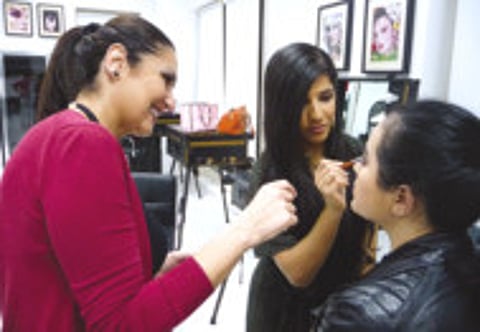The Beauty Beat: Sneak peek at Esmod’s make-up class
At the French institute’s professional class, learning the art of make-up is a science

In the age of Instagram make-up, it can seem like everyone who owns a brush and an eyeshadow palette is a make-up artist. However, technical skill is not something you can learn from a YouTube tutorial. At the French fashion school Esmod, the teaching of make-up is a science, and Caroline Chadarevian is the scientist.
Chadarevian has been involved in make-up artistry for many years and has been conducting Esmod’s Professional Fashion Makeup Programme for five months. She says there’s no substitute for good old fashioned schooling.
“Students get to learn the profession of a make-up artist from a pro who’s active on the market... not only from a teacher, which is a big plus. They get exposed to different make-up styles and different techniques to adapt to various faces... and find the answers to their questions,” Chadarevian said.
And there are lots of questions for her from students as she conducts here class, which I got a sneak peek of at an evening session at the Academic City institute. It’s an organised classroom, with professional make-up cases set up around the room, and a large table in the centre full of make-up for students to pick from.
On the day I attend, Chadarevian is testing the students on their smoky eye skills. Each student has a model whom they work on. It’s a casual atmosphere, with laughing and joking, but there are also tips and critiques for everyone.
In a chat with Gulf News tabloid! Chadarevian she talks about what students learn at Esmod, and some tips for the everyday woman.
What are the benefits of learning make-up in a school, rather than learning by yourself?
Learning the international standard of make-up in a professional school like Esmod Dubai makes a big difference. They learn, so to speak, the ‘science’ behind make-up artistry, and understand the reasons behind the do’s and don’ts.
They become able to use colour correction for flawless skin and to correct, with make-up, the different face and eye shapes. They also learn the rules and steps for preparing [for] fashion shows, TV and photo-shoot.
On top of all of that, they get the chance to practice with professional guidance and correct any mistakes they have learnt in the past. Finally, they are officially certified as professional make-up artists and begin to build their professional portfolio for their career.
What are skill levels of the students you teach?
There are students who join our classes with very little knowledge about make-up and develop tremendous make-up application skills by the time they graduate.
I have a couple of students who are already working as make-up artists for quite some time but after the course they found that learning the rules and principles of make-up is a totally different experience. They are now much more confident in every make-up style they do. They use the right technique for a better result.
What is the market like for make-up artists in the Middle East?
The Middle East and specifically the Gulf is a huge market for make-up. Almost all the international make-up brands are available in the market and are expanding. Make-up artists get involved in the market through a wide range of work opportunities: establishing their own private business, working as freelancers, in sales and in beauty salons, being part of fashion shows and joining TV make-up teams. They also work as consultants and in some cases represent make-up companies.
What are 5 tips you can give those who are beginners at make-up?
— Keep your make-up simple and natural — make-up is used to enhance your beauty, not to paint a new face.
— Blend your make-up well — soft make-up is beautiful so don’t [have] harsh lines in your eye make-up or face contouring.
— Don’t follow the trend but consider what suits your own face, eye shape, age and the occasion you are applying make-up for.
— If your eyes are small or round don’t define them with dark eyeliner or dark kohl in the waterline. Such application will make them look smaller. Instead use the eyeliner in the outer corner and use white or coloured pencil in the waterline.
— Avoid applying foundation on a daily basis. Instead, and if you want fairly good coverage, use BB Cream as it hydrates the skin, helps blur imperfections and protects the skin from the sun.
Check it out
Esmod’s Professional Fashion Makeup Programme costs Dh12,300 and runs for two-and-a-half months. The next batch of classes begins on May 17. Go to esmod-dubai.com for more information.
Sign up for the Daily Briefing
Get the latest news and updates straight to your inbox


